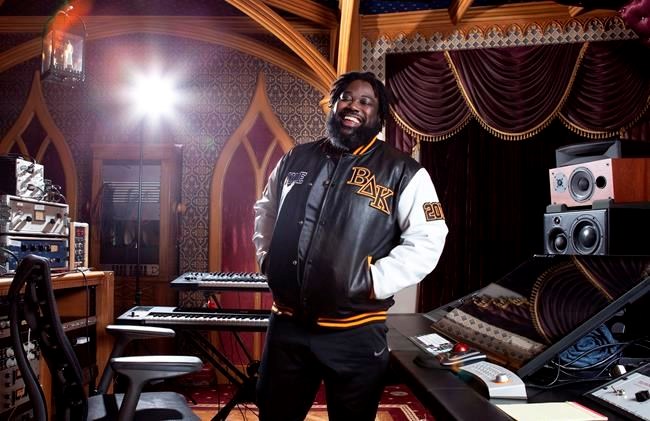NEW YORK — With police brutality continuing to devastate Black families and the coronavirus ravishing Black America disproportionately, the world was driven to the significance of this year’s Juneteenth more than ever before.
And Beyoncé knew she wanted to release a song on that momentous day — so she dropped “Black Parade,” an anthemic jam where she proudly sings about her heritage, hometown and returning to her African roots.
Months later, the song — and others focused on protesting, police brutality and the overall Black experience — are taking
Beyoncé’s “Black Parade” scored nominations for two of the top awards: song of the year and record of the year. The track will also compete for best R&B song and best R&B performance.
“There could have been a different approach as far as releasing the record and capitalizing off of timings of other things, but we really wanted to get it out during a time where we could all remember the feeling and the energy,” Derek Dixie, a longtime collaborator of Beyoncé’s who co-wrote the song with the pop star, said in an interview with The Associated Press.
“It’s not always about the money and about catching streaming numbers and things like that. Sometimes it’s just about what it is — which was making our people proud.”
“Black Parade” helped Beyoncé land nine nominations, making her the overall top Grammy contender. Dixie earned three Grammy nominations for co-writing and co-producing the song.
For song of the year, “Black Parade” will compete with H.E.R.’s “I Can’t Breathe,” the R&B singer’s track about police brutality.
Lil Baby’s “The Bigger Picture,” a protest song he created in the wake of the killing of George Floyd, scored nominations for best rap song and best rap performance. Proceeds from the song will support the Black Lives Matter movement, Breonna Taylor’s attorney, the Bail Project and the National Association of Black Journalists.
Anderson .Paak also released a song on Juneteenth — the holiday that commemorates when the last enslaved African Americans learned they were free — and it’s competing for two awards. “Lockdown” is nominated for best rap performance and best music video..
Country singer Mickey Guyton wrote the track “Black Like Me” a year ago but released it this year because she felt it was extremely relevant. Now, it’s nominated for best country solo performance, giving the performer her first-ever Grammy nomination.
“It’s been so hard in the country music community and trying to get country music to even support my music and for me to get a Grammy (nomination), it just goes to show that writing your truth is just the way to go,” Guyton told the AP on Tuesday. “And not only writing your truth, but really bringing your brothers and sisters up with you.”
But Guyton admits that everyone’s response to her song wasn’t warm. It features the lyrics, “If you think we live in the land of the free/You should try to be Black like me."
“I released it and I did get people that were very angry. There were even radio stations that people were like, ‘Get this (expletive) off of my radio station,’” she said. “I would get people writing me messages like, ‘Well, if you don’t like it here then leave.’ And I’m like, ‘Well, it’s just as much my country as it is yours.’”
Guyton added that some “radio stations were scared to play (‘Black Like Me’) because they were (angering) their listeners because their listeners didn’t want to hear that.”
“But I wasn’t writing that song for them, I was writing that song got the people that understand this exact walk that I’m walking," she continued. “It’s for them."
Apart from “Black Parade,” Beyoncé also earned nominations for her film
Dixie, who has worked as Beyoncé’s music director and has produced, engineered and arranged songs for the singer, said he’s grateful he’s working with an artist who boldly speaks about Black pride in her music.
“It’s just good to see that she’s willing to put that type of energy out and not necessarily be thinking about: ‘What’s going to guarantee me a No. 1? What’s going to guarantee me this?' It’s a part of our conversation, it’s a part of the process, but when it’s necessary to put that art out there, to put that energy out there, she’s usually ... leading the pack in that regard,” Dixie said. “So I’m grateful to be associated with her on that path.”
Guyton added that it’s comforting to see some many Black musicians reflect the current times in their music, and she’s grateful to the Grammys for acknowledging those kinds of songs.
“It’s so important because so often Black people, and Black women especially, are getting overlooked and constantly get overlooked and you’re constantly just trying to get people to remember that you’re there,” she said. “It feels like we’re seen and I don’t think we’ve always felt seen.”
“I use this scenario of going into any grocery store — if you go to any grocery store ... and you look for hair products for someone who is ethnic and ... you see an entire aisle full of every and any hair product you can possibly think for someone that is not Black. But whenever it comes to finding hair products for a Black person, we’re designated a shelf. And today, it doesn't feel like we’re designated a shelf.”
The 2021 Grammy Awards will air live on Jan. 31.
Mesfin Fekadu, The Associated Press




